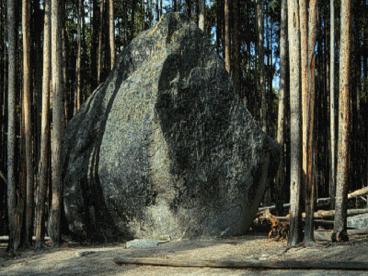Glaciers: Part 1 - PowerPoint PPT Presentation
1 / 51
Title:
Glaciers: Part 1
Description:
AR TES: steep-sided, sharp-edged bedrock ridge formed by two ... AR TE. CIRQUE. HANGING VALLEY. U-SHAPED VALLEY. Glaciers: Movement. What makes them move? ... – PowerPoint PPT presentation
Number of Views:35
Avg rating:3.0/5.0
Title: Glaciers: Part 1
1
(No Transcript)
2
(No Transcript)
3
(No Transcript)
4
(No Transcript)
5
(No Transcript)
6
Evidence for Glaciers-the small stuff
- Erratics!
- Unsorted material
- Striations
- Polished Bedrock
7
(No Transcript)
8
Erratic-A boulder-sized rock dumped by a
glacier. The rock is usually of a different type
that the surrounding rock
9
Unsorted Materials-all sizes mixed together.
10
(No Transcript)
11
Striations-Grooves carved into the bedrock by
pebbles and cobbles carried at the bottom of a
glacier.
12
(No Transcript)
13
(No Transcript)
14
Glacial Polish-Smooth rock surfaces created as
glaciers flow over bedrock.
15
Glacial Pavement.
16
(No Transcript)
17
Conditions for Glacier Formation
- Cold Summers!!
- Located above the snow line, or in polar regions.
- Presently occupy 10 of worlds total land area
(32 during ICE AGES) - Form on all continents BUT Australia
18
Snow becomes Firn
19
Process of Glacier Formation
- Snow does NOT melt in summer
- Recrystallization of snow to form LARGE crystals
of ice (rough and granular) - called FIRN liked packed snowballs
- Lower layers turn to SOLID ICE under the weight
of overlying firn and snow.
20
Glaciers Types
- VALLEY GLACIERS long, slow-moving, wedge-shaped
streams of ice found in alpine areas (high
elevation) - small 1-2 km long, 100s m wide, 100s m deep
- largest Over 100kms long X 100s m deep
- CONTINENTAL GLACIER (ICE SHEETS) very old
(1000s of years), thick (1000s of meters) mass
of ice covering almost an entire land mass - GREENLAND 1.7 Million SQ MI , 3 KM thick
- ANTARCTIC 12.5 Million SQ MI, 5 KM thick
21
Landscape Features- Valley Glaciers -the BIG
stuff
- CIRQUES semi-circular shaped bedrock feature
created as a glacier scours back toward the
mountain (1st place snow and ice accumulate) - ARÊTES steep-sided, sharp-edged bedrock ridge
formed by two glaciers eroding away on opposite
sides of a ridge - HORNS 3 or more cirques adjacent to one another
- TARNS glacial lakes produced by glacial
scouring- often found in cirques
22
ARÊTE
CIRQUE
23
(No Transcript)
24
CIRQUE
TARN
25
Landscape Features- Valley Glaciers-the BIG
stuff
- HANGING VALLEY valley eroded by a small
tributary glacier floor is at a higher elevation
that valley it feeds into - U-SHAPED VALLEY a glacially eroded valley also
called a glacial trough
26
ARÊTE
CIRQUE
HANGING VALLEY
U-SHAPED VALLEY
27
(No Transcript)
28
Glaciers Movement
- What makes them move?
- WEIGHT the weight of the overlying mass forces
the ice to spread out. - FLOW ice is slippery! Flows over underlying
rock/soil - speed is like a stream faster in middle/less
friction - fastest movement after heavy winters, steep
slopes, and in summer - CREVASSES form along steep slopes
29
FASTEST
30
A CREVASSE- Evidence of movement
31
Glaciers Movement
- How far do they move?
- BELOW SNOWLINE Glaciers begin to melt and
evaporate, thinning out (lower elevation/latitude)
- ICEFRONT the front edge of a glacier
- MELTINGMOVEMENT Stationary Ice Front
- EXTEND TO THE SEA break off CALVING
32
Glaciers Movement
- What do they move?
- LOOSE ROCK any size, picked up from underlying
land - FALL-IN rocks fall in from surrounding elevation
- TRIBUTARY GLACIERS carried from smaller,
surrounding glaciers
33
CONTINENTAL ICE SHEETS
34
CONTINENTAL GLACIERS FEATURES
- MORAINES rock build-up in a glacier
- Ground Moraine carried in the bottom of a
glacier pre-deposition - Lateral Moraine pile up along the sides
- Medial moraine material within the glacier (two
come together) - End moraine occurs at the ice front
- ROCK FLOUR fine sand and silt crushed from rock
- GLACIAL MILK meltwater carrying Rock Flour!
35
(No Transcript)
36
(No Transcript)
37
(No Transcript)
38
Glacial Deposits whats left?
- DRIFT all deposits of glacial origin.
- TILL unsorted/unstratified material left by
GLACIERS. - OUTWASH deposits made by streams after glaciers
melt (sorted/stratified)
39
Glacial Deposits whats left?
- MORAINES after all the ice recedes, piles of
sediment are deposited. - RECESSIONAL MORAINE slowly retreat of end
moraine leaves smaller rows of sediments behind. - TERMINAL MORAINE deposit marking the glaciers
farthest advance.
40
(No Transcript)
41
(No Transcript)
42
(No Transcript)
43
(No Transcript)
44
(No Transcript)
45
(No Transcript)
46
(No Transcript)
47
(No Transcript)
48
Kettle Lake
Drumlins
Esker
Outwash plain
Till
Moraine-dammed lake
Glacial Stream
Terminal Moraine
49
Long Island- Terminal Moraine
50
(No Transcript)
51
(No Transcript)































